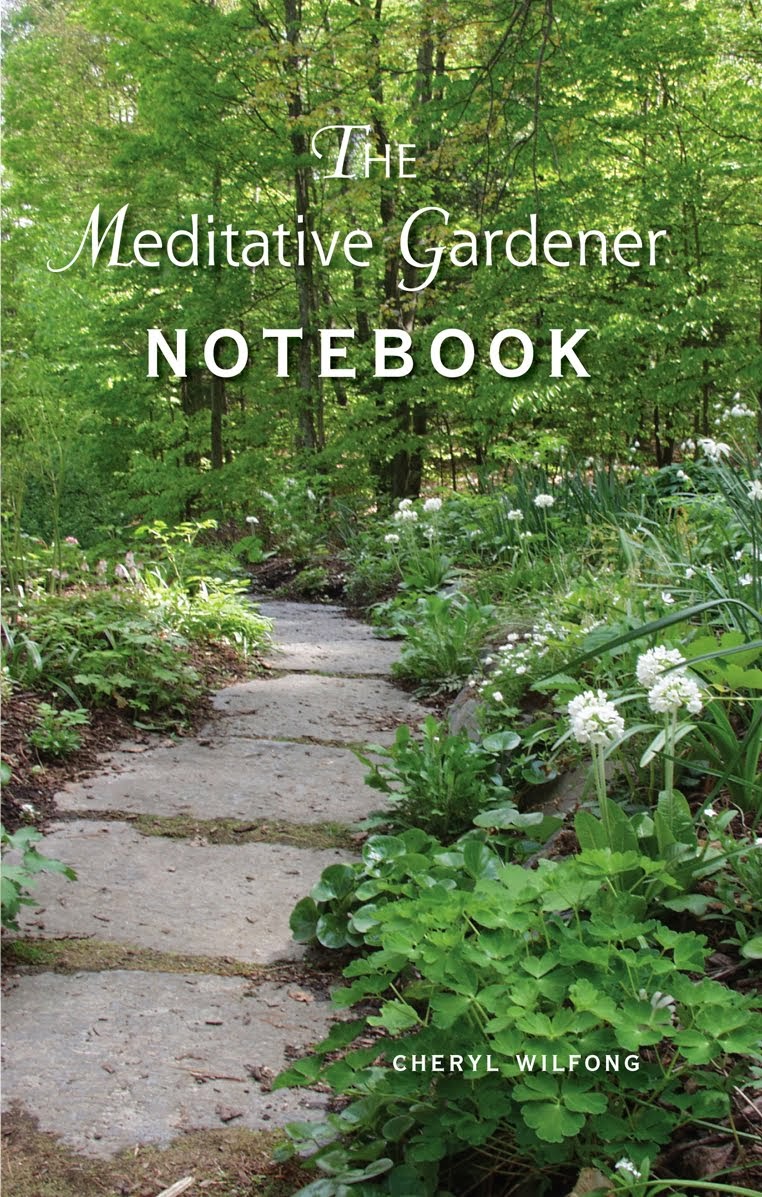Living in the north country means having your driveway snow-plowed after every snowfall. Herein comes the dilemma: the snowplow or the garden?
To defend my kitchen garden at the end of the driveway from the winter's moraine of driveway gravel, i installed two sections of fence separated by an arbor--a lovely transition from the parking area to a green and flowering "room."
The male in my household comes down firmly on the side of the snowplow and faithfully removes the fence sections every November. In April, after snowmelt, i may have to remind him to replace them.
Every spring i find that the snowplow has done some gardening for me. Three years ago, i found a hosta growing in the woods. How did it get there? It took me a while to piece together the story of the snowplow nicking it out of the side of the driveway and bulldozing it into the huge snow fort at the end of his run. Fortunately the hosta survived. As did a lady fern the following year.
This week i found mitella (miterwort) and lamium refugees from my white garden at the front door camped about 20 feet away in a grove of maidenhair fern.
Of course, the question is not EITHER the snowplow OR the garden. The question is: the snowplow AND the garden.
Wednesday, March 31, 2010
Tuesday, March 30, 2010
Coltsfoot & Dandelion
The first spring wildflower is blooming on the edge of dirt roads near marshy areas. At first, i thought they were dandelions, but these bright yellow flowers have no leaves when they blossom.
Coltsfoot--so named for the shape of its leaf, just as "dente de lion" (lion's tooth) is named for the shape of its leaf. The leaves of both plants can be used in early spring salads.
Gardeners may consider both coltsfoot and dandelions invasive, but herbalists decoct coltsfoot leaves for colds, flu, and asthma. The dandelion is completely useful--the flowers for cosmetics, the leaves for vitamins A and C, and the root as a coffee substitute or as magenta dye.
Isn't it interesting how our "enemies"--plants, in this case--turn out to befriend us when we look at them more deeply?
Coltsfoot--so named for the shape of its leaf, just as "dente de lion" (lion's tooth) is named for the shape of its leaf. The leaves of both plants can be used in early spring salads.
Gardeners may consider both coltsfoot and dandelions invasive, but herbalists decoct coltsfoot leaves for colds, flu, and asthma. The dandelion is completely useful--the flowers for cosmetics, the leaves for vitamins A and C, and the root as a coffee substitute or as magenta dye.
Isn't it interesting how our "enemies"--plants, in this case--turn out to befriend us when we look at them more deeply?
Monday, March 29, 2010
Rooting Cuttings
I'm taking cuttings from every leggy houseplant. Now my solarium looks like a do-it-yourself nursery.
The purple wandering jew roots so easily in a glass of water with thick, tan, succulent roots that i am confident it will survive wherever i put it. In 6 weeks, i'll plant its purple foliage next to the Japanese painted fern.
I've cut the "spiders" off the spider plant. These also root very easily, and i'll use them as an edging for my white garden.
Those leggy geraniums that have bloomed all winter definitely need to be trimmed. By May, the plant in the pot will be bushy again. But the cuttings.... Well, i've tried rolling them in rooting powder; i've tried starting them in a glass of water; i've tried filling the glass with vermiculite and water and pushing the cuttings in ever so gently; and i've tried starting them in soil. About half the cuttings rot before they root. Geraniums do root particularly well where new green growth is already occurring.
Despite my low success rate, i don't give up on geraniums. Sometimes my meditation practice feels like not much is happening either. Some mornings it seems like the meditation just doesn't "root." Other mornings meditation blooms.
No matter what. I don't stop meditating. I want calm to take root in my life.
The purple wandering jew roots so easily in a glass of water with thick, tan, succulent roots that i am confident it will survive wherever i put it. In 6 weeks, i'll plant its purple foliage next to the Japanese painted fern.
I've cut the "spiders" off the spider plant. These also root very easily, and i'll use them as an edging for my white garden.
Those leggy geraniums that have bloomed all winter definitely need to be trimmed. By May, the plant in the pot will be bushy again. But the cuttings.... Well, i've tried rolling them in rooting powder; i've tried starting them in a glass of water; i've tried filling the glass with vermiculite and water and pushing the cuttings in ever so gently; and i've tried starting them in soil. About half the cuttings rot before they root. Geraniums do root particularly well where new green growth is already occurring.
Despite my low success rate, i don't give up on geraniums. Sometimes my meditation practice feels like not much is happening either. Some mornings it seems like the meditation just doesn't "root." Other mornings meditation blooms.
No matter what. I don't stop meditating. I want calm to take root in my life.
Sunday, March 28, 2010
Wasted Food
I have this thing about wasting food. I don't like to do it. I'm the person who takes home a doggy bag even though i don't have a dog.
I am a member of the clean plate club, even though most professional women i know order salad at a restaurant and then send half of it back to the kitchen. I used to think of this as wasting food.
Then i saw that all food is "wasted." It goes into our bodies and comes out as waste. The leftovers that don't go through our bodies are also waste--going directly to the compost or garbage disposal or landfill.
Anyway you cut it, food become waste. That's just the nature of it.
I am a member of the clean plate club, even though most professional women i know order salad at a restaurant and then send half of it back to the kitchen. I used to think of this as wasting food.
Then i saw that all food is "wasted." It goes into our bodies and comes out as waste. The leftovers that don't go through our bodies are also waste--going directly to the compost or garbage disposal or landfill.
Anyway you cut it, food become waste. That's just the nature of it.
Friday, March 26, 2010
Compost Bins
I have 3 side-by-side compost bins. The newest one is added to every day--garbage and leaves, last fall's dead mums, dead pine needles and pine cones. Another pile was topped off last fall with a layer of manure from the local farm. Now it sits there, gestating, lost under an accumulation of last fall's leaves. The third pile is the one i dig into almost every day--using its rich black humus to transplant plants or to pot up extra plants i find volunteering in places i don't want them.
This third pile--the one that's being subtracted from--has collected a winter's cap of leaves to keep itself warm, but now i rake it clean and toss the leaves into the neighboring bin. Having removed the skim of leaves, i finally see the half-used heap--dead leaves, dead mums, dead flowers and garbage all miraculous digested and transformed into living soil.
This third pile--the one that's being subtracted from--has collected a winter's cap of leaves to keep itself warm, but now i rake it clean and toss the leaves into the neighboring bin. Having removed the skim of leaves, i finally see the half-used heap--dead leaves, dead mums, dead flowers and garbage all miraculous digested and transformed into living soil.
Thursday, March 25, 2010
Johnny-jumps-up in the Garden
Johnny-jump-ups (Viola spp.) and foxgloves volunteer in abundance out in the vegetable garden. But i don't want them to grow there, i want vegetables to grow in the vegetable garden. I want foxgloves to grow in a flowerbed next to the house. I've tried transplanting them there, but i can tell they're not truly happy--they don't return the next year.
This is just your garden-variety dukkha (stress): things don't happen like you want them to.
Then i tried transplanting the foxgloves in a shady bed where a pine tree used to grow. By June i had a pinky-purple velvet spiky garden of foxgloves that i looked at every time i walked out the front door.
The violas i transplanted under a hemlock tree. They've already started blooming and will continue to jump and shout until they trip over their own legginess and fall down in a heap in mid-summer. But for the next 3 months i'll have a throng of johnny-jump-ups brightening a shady corner of the garden with their miniature pansy faces.
This is just your garden-variety dukkha (stress): things don't happen like you want them to.
Then i tried transplanting the foxgloves in a shady bed where a pine tree used to grow. By June i had a pinky-purple velvet spiky garden of foxgloves that i looked at every time i walked out the front door.
The violas i transplanted under a hemlock tree. They've already started blooming and will continue to jump and shout until they trip over their own legginess and fall down in a heap in mid-summer. But for the next 3 months i'll have a throng of johnny-jump-ups brightening a shady corner of the garden with their miniature pansy faces.
Wednesday, March 24, 2010
Garden Karma
In Native American traditions, March is sometimes called Starvation Moon. By this time of year, last summer's harvests are running low or have completely been devoured. Now, before the first green shoots and roots of spring, there is nothing to eat except the cambium layer of a few trees.
My own stores of last summer's harvest are thinning out. One pumpkin remains in the cellar. I still have about 3 dozen onions and a like number of garlic. The crisper drawer in the apartment-sized refrigerator in the basement is full of potatoes. But i only have one chili's worth of tomatillos left.
Let me sing the praises of tomatillos--green tomato-like fruits in a paper husk--that are used in in Mexican cooking. I picked them 7 months ago, and now they are ripe and ready for cooking. Not unlike the fruits of our karma that ripen sometime in the future--sometimes sooner, sometimes later.
"You reap what you sow" applies not only to the fruits of our labors, but to our thoughts and actions as well. Today, as we tend our inner and outer gardens, may we cultivate the seeds of kindness.
My own stores of last summer's harvest are thinning out. One pumpkin remains in the cellar. I still have about 3 dozen onions and a like number of garlic. The crisper drawer in the apartment-sized refrigerator in the basement is full of potatoes. But i only have one chili's worth of tomatillos left.
Let me sing the praises of tomatillos--green tomato-like fruits in a paper husk--that are used in in Mexican cooking. I picked them 7 months ago, and now they are ripe and ready for cooking. Not unlike the fruits of our karma that ripen sometime in the future--sometimes sooner, sometimes later.
"You reap what you sow" applies not only to the fruits of our labors, but to our thoughts and actions as well. Today, as we tend our inner and outer gardens, may we cultivate the seeds of kindness.
Tuesday, March 23, 2010
Tree Detritus
These early spring days--unseasonably warm--spring me from the house as if the March wind has unfurled a New Year's noisemaker.
What to do while the lawn is still soggy with snowmelt? I wrestle the garden cart out of the garden shed, where it's been stuffed all winter with other gardening paraphernalia. Of course, the cart's 2 bicycle tires on either side are nearly flat from the deflation of freezing cold. Pump them up, so that i can be the beast of burden and haul sticks to the brush pile.
Old Man Winter pruned more than the usual amount this year. Heavy pine boughs lie marooned at the edge of the driveway. Birch branches--both white and black--litter the lawn, the road, and my woodland walk.
In with the new season, out with the old exfoliated detritus of trees.
What to do while the lawn is still soggy with snowmelt? I wrestle the garden cart out of the garden shed, where it's been stuffed all winter with other gardening paraphernalia. Of course, the cart's 2 bicycle tires on either side are nearly flat from the deflation of freezing cold. Pump them up, so that i can be the beast of burden and haul sticks to the brush pile.
Old Man Winter pruned more than the usual amount this year. Heavy pine boughs lie marooned at the edge of the driveway. Birch branches--both white and black--litter the lawn, the road, and my woodland walk.
In with the new season, out with the old exfoliated detritus of trees.
Friday, March 19, 2010
Robins Rejoice!
Robins are rejoicing this early morning, singing their "Cheer-up, Cheer-lee" ode to joy that bare ground has appeared. Let the worm feast begin!
We too can perch for a moment in a comfortable chair with a nice view, perhaps with a cup of tea in hand, and express our gratitude that we have lived to see another day. Daylight is steaming ahead full-throttle, warming our bodies so that jackets are superfluous.
We can count our blessings, not least of which is listening to the robins singing praises to spring.
We too can perch for a moment in a comfortable chair with a nice view, perhaps with a cup of tea in hand, and express our gratitude that we have lived to see another day. Daylight is steaming ahead full-throttle, warming our bodies so that jackets are superfluous.
We can count our blessings, not least of which is listening to the robins singing praises to spring.
Thursday, March 18, 2010
Cold Feet
The snow on the septic tank melted today--a perfect rectangle of brown-green grass in an otherwise white yard of snow. In town, crocus and iris reticulata are already blooming, but my country-cousin climate lags a few days behind.
I've planted crocus on my septic tank in order to have some early blooms--a patch of yellow and purple in the center of the yard.
Noticing the particulars of the micro-climates in your own yard requires observation and a bit of curiosity. Those same skills are very helpful in developing a meditation practice. I doze off if i'm wearing socks when i sit. My personal climate does better when the body is cool. Cold feet can actually prevent my restless legs from twitching uncontrollably.
After all, if the crocus and snowdrops thrive with "cold feet," so can i.
I've planted crocus on my septic tank in order to have some early blooms--a patch of yellow and purple in the center of the yard.
Noticing the particulars of the micro-climates in your own yard requires observation and a bit of curiosity. Those same skills are very helpful in developing a meditation practice. I doze off if i'm wearing socks when i sit. My personal climate does better when the body is cool. Cold feet can actually prevent my restless legs from twitching uncontrollably.
After all, if the crocus and snowdrops thrive with "cold feet," so can i.
Thursday, March 4, 2010
Gardening in the Snow
My 84-year-old friend, Trudy Crites, tells me it's time to scatter poppy seeds. NOW. Now when my flower beds are covered with a foot of snow.
You know how you feel when you hear truth?
Something inside relaxes. Oh! Yes. The body relaxes; then the mind gets busy and tells you a story. The mind is so entertaining, and the story so believable (even if it's not true), that it's easy to miss that initial body response of calmness.
Regarding poppies, i have tried scattering the seeds in the cold mud of April--a month before the last frost date here in the north country. I've never quite been satisfied with the results.
In late autumn, i've seen teensy-weensy two-leaved poppies volunteering, so i know they like to get an early start. Really early.
I'm strapping on my snowshoes right now to go out to the garden and plant poppy seeds.
You know how you feel when you hear truth?
Something inside relaxes. Oh! Yes. The body relaxes; then the mind gets busy and tells you a story. The mind is so entertaining, and the story so believable (even if it's not true), that it's easy to miss that initial body response of calmness.
Regarding poppies, i have tried scattering the seeds in the cold mud of April--a month before the last frost date here in the north country. I've never quite been satisfied with the results.
In late autumn, i've seen teensy-weensy two-leaved poppies volunteering, so i know they like to get an early start. Really early.
I'm strapping on my snowshoes right now to go out to the garden and plant poppy seeds.
Subscribe to:
Posts (Atom)



















